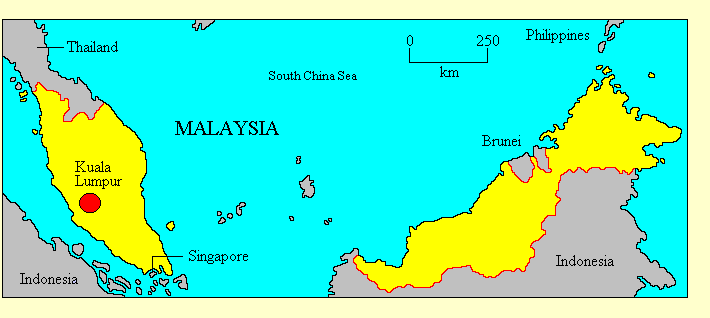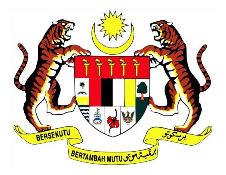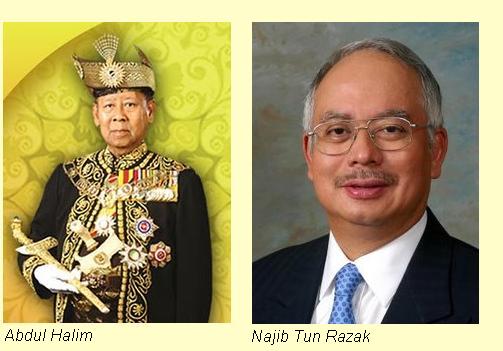
MALAYSIA
• Official name: Malaysia
• Location: South East Asia
• International organisations: Asia-Pacific Economic Co-operation Forum, Association of South East Asian
Nations, Commonwealth of Nations, Non-Aligned Movement, Organisation of Islamic Conference, United Nations,
World Trade Organisation
• Borders: Brunei, Indonesia, Thailand
• Coastline: Strait of Malacca, South China Sea, Sulu Sea
• Land area: 329,750 Km2
• Population: 28,300,000
• Annual GDP (PPP) per capita: US$14,800 (2009 CIA estimate). World ranking: 59

• Ethnicity: Malays and related peoples constitute a majority (58%) of the
population. There is a large (24%) Chinese minority, and smaller Indian (8%) and other
minorities. (These figures are disputed. Some sources put the Chinese minority as high
as 30% of the population.)
• Languages: Bahasa Melayu is the official language, but is spoken by less than 60%
of the population as their first language. At least 10% speak Chinese languages, mainly
Yue (Cantonese), as their first language. Indian languages and Thai are also spoken. English
is widely used in government, business and the media.
• Religion: Islam is the state religion but freedom of religion is guaranteed. About
60% of the population are Sunni Moslems, 14% are Buddhists, 10% follow other Chinese
religions and about 6% are Hindus. There is a small Christian minority.
• Form of government: Constitutional monarchy, federal parliamentary
democracy. Malaysia is a federation of 13 states and three federal districts. The states have
elected legislatures and retain considerable autonomy. The two eastern states of Sabah and
Sarawak have greater local autonomy than the states of Peninsular Malaysia.

• Capital: Kuala Lumpur (The new seat of government is at Putrajaya outside the capital.)
• Constitution: The
Constitution of Malaysia came into effect on 16 September 1963.
• Head of state: Malaysia has a unique system of rotating monarchy. The hereditary
rulers of the federal states serve in turn as head
of state, for a term of five years. The ruler is called the Supreme Head of State
(Yang di-Pertuan Agong). The current Head of State,
Tuanku Abdul Halim Mu'adzam Shah ibni Sultan Badlishah,
Sultan of Kedah, took office (for the second time) on 13 December 2011.
• Head of government: The Prime Minister, appointed by the Head of State. The Prime
Minister is the leader of the largest party in the legislature and is accountable to it.
• Legislature: Malaysia has a bicameral legislature, the Parliament,
although only one chamber is elected by the people. The House of Representatives (Dewan Rakyat)
has 193 members, elected for five-year terms from single-member constituencies. The
Senate (Dewan Negara) consists of 26 representatives of the States, chosen for
six year terms, and 43 appointed members.
• Electoral authority: The Election Commission Malaysia
administers national elections.
• Freedom House 2011 rating: Political Rights 4, Civil Liberties 4
• Transparency International Corruption Index: 44% (56 of 178 countries rated)
• Reporters Without Borders Press Freedom 2010 Index: 49.2% (141 of 178 countries rated)
• Heritage Foundation Economic Freedom 2010 Index: 66.3% (53 of 178 countries rated)
Political history
The various independent Sultanates of the Malay Peninsula were brought under British
rule between 1786 and 1914. Singapore was founded as a British colony in 1819. North Borneo was
brought under British rule in 1888. Sarawak became the private property of the Brook family, known as
the "White Rajahs," before being brought under British supervision in 1888.
In 1942 all these territories were overrun by the Japanese, and although the British returned in 1945
this disaster caused great damage to British prestige. Agitation for
self-government and eventual independence led to the formation of the Federation of
Malaya in 1948, with an elected Legislative Council. Constitutional development was hampered
by ethnic rivalries, and also by a Communist insurgency which was not fully defeated until the 1960s.

Malaya became internally self-governing in 1956 and fully independent in 1957.
In 1963 the Federation of Malaysia was formed, uniting Malaya with Singapore, Sarawak and
North Borneo, which was renamed Sabah. In 1964, however, Singapore, which has a Chinese majority, peacefully
seceded from the federation.
The dominant issue of Malaysian politics since independence has been the
relations between the rural Malay majority and the urban Chinese minority. The
United Malays National Organisation (UMNO), which
has been in power throughout Malaysia's history, has sought to transfer economic power to
the Malays. The principal Chinese party, the Malaysian Chinese Organisation,
has protected Chinese interests by collaborating with UMNO in a perpetual
coalition called the National Front (Barisan Nasional). The
Malaysian Indian Congress and several minor parties in Sarawak and Sabah
also belong to the front. Although Malaysia prospered mightily under forty years of UMNO rule, it was until
recently something close to a one-party state. The government's authoritarian tendencies grew more obvious
under Dr Mahathir bin Mohamed, Prime Minister from 1981 to 2003. In 1999 Mahathir had his main rival within
UMNO, Anwar Ibrahim, jailed on trumped up charges.
UMNO rule was secure so long as it had the united support of the Malay majority and the only significant
opposition party was the Chinese-dominated social-democratic party, the
Democratic Action Party (DAP).
The split in UMNO led to the founding of a new Malay-based party led by Anwar, the
People's Justice Party (PKR or Keadlin), which then formed an
alliance with the DAP and with the Islamic Party of Malaysia,
which has support among rural Malays, particularly in the north, despite the three parties' incompatible ideologies.
At the 2008 election the opposition coalition won 62 seats from the government, which retained office
only thanks to members from Sarawak and Sabah. In the politically vital states of West Malaysia,
Keadlin made major gains among Malay voters, while the DAP took most of the MCA's seats in the Chinese areas. This
setback forced the Prime Minister, Abdullah Ahmad Badawi, out of office, and in April 2009 he was
succeeded by Najib Tun Razak.
Freedom House's 2011 report on
says: "Malaysia is not an electoral democracy... [The opposition's] dramatic electoral gains [in 2008] came despite
serious obstacles, such as unequal access to the media and restrictions on campaigning and freedom of assembly, which
left them unable to compete on equal terms with the BN. The country's first-past-the-post voting system also increases
the power of the largest grouping, and national electoral outcomes have been affected by the malapportionment of
constituencies in favor of East Malaysia... The Election Commission (EC) is frequently accused of manipulating electoral
rolls and gerrymandering districts to aid the ruling coalition... The government and law enforcement bodies have
suffered a series of corruption scandals in recent years, despite the BN's anticorruption campaign pledges...
Freedom of expression is constitutionally guaranteed but restricted in practice. The 1984 Printing Presses and Publications
Act gives the government the authority to revoke licenses without judicial review... While the BN government continues to
articulate the need for a tolerant and inclusive form of Islam, religious freedom is restricted in Malaysia...
The government restricts academic freedom... Freedoms of assembly and association are limited on the grounds of maintaining
security and public order... Judicial independence has been compromised by extensive executive influence. Arbitrary or
politically motivated verdicts are not uncommon, with the most prominent case being the convictions of Anwar Ibrahim in
1999 and 2000 for corruption and sodomy."
Updated January 2012
|


